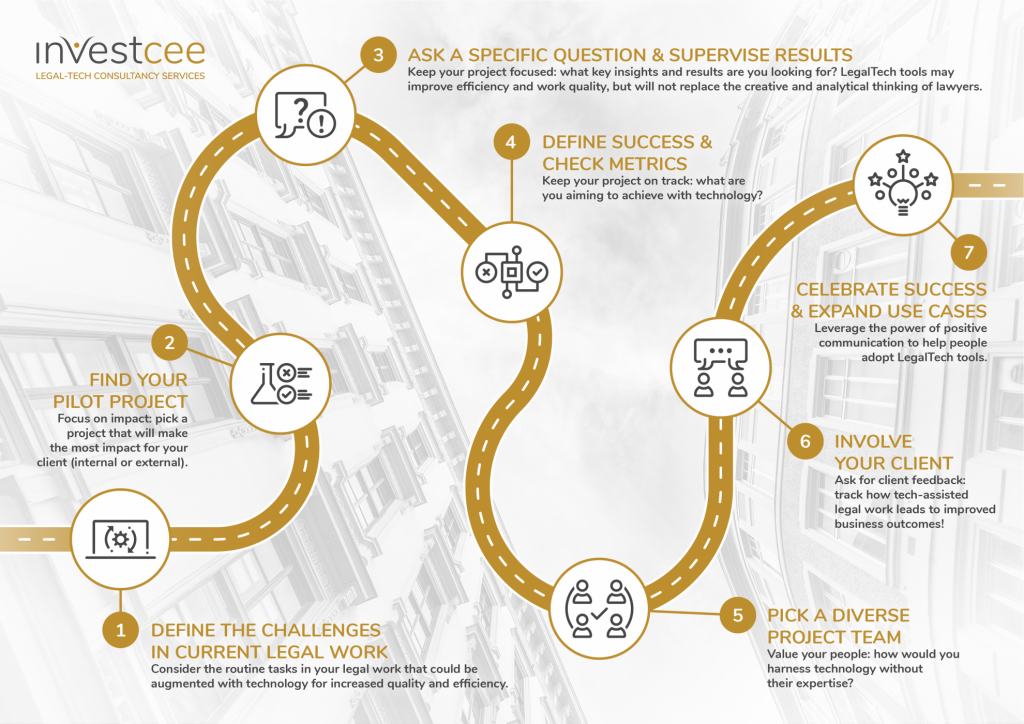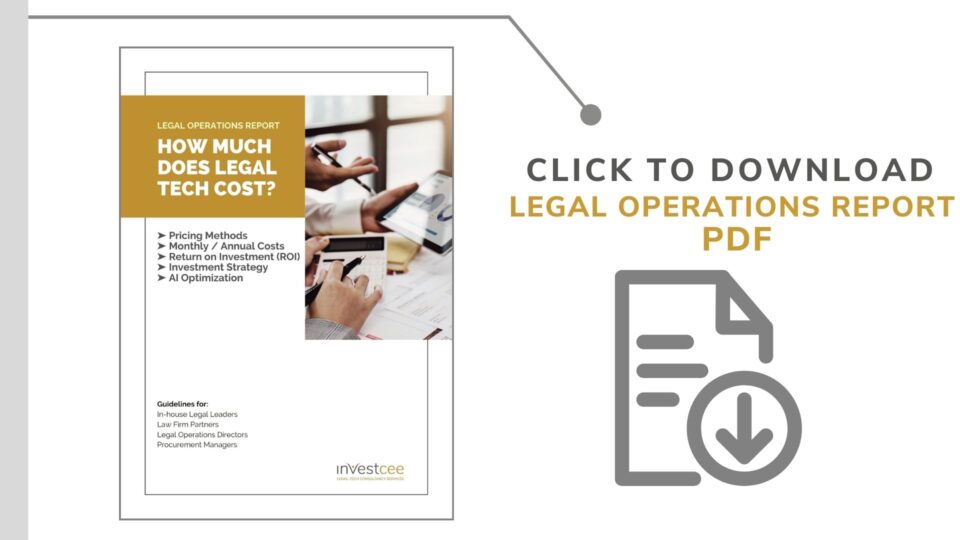Here is a summary of InvestCEE’s key learnings in applying the innovation formula in legal context. Key takeaways from the Making Legal Innovation Work presentation at Legal Market Day 2020:
#1 PEOPLE: strategize, team up and beware of negativity
With digital transformation going mainstream in the legal industry, leaders of legal departments or law firms may find themselves in a key innovation role, possibly under pressure by their teams and organizations who may be looking at them to set the direction in these changing, uncertain times. To figure out how to innovate legal services in a given context, the very first step is sparing time for strategic thinking. Next, it is essential for legal leaders to team up with decision-makers from business teams to get the ball rolling on a legal innovation strategy and enable the budget for a pilot project. In a corporate context, sometimes the initiative comes from the lawyers, sometimes from the business people, but a successful legal innovation project requires both sides to collaborate in an efficient manner.
Yet even when lawyers have the best allies in the world (possibly the whole C-suite lined up behind a project), legal leaders still need to be cautious about negative voices in the organization. More often than expected, it will suffice to just have one single voice of negativity in a business unit or project team that can cast a long shadow on a great initiative. In InvestCEE’s experience, to make legal innovation work, project leaders must go out of their way to remind team members of the goals they aim to achieve, the progress they are making and to celebrate small wins as frequently as possible.
#2 PROCESS: assess, structure & standardize
It is essential to carefully assess all aspects that require improvement in a given legal workstream BEFORE investing into any technology. Yet sorting out internal processes and then moving on to structuring and standardizing traditional workstreams may be tricky. Lawyers are super smart and often think they can do it all by themselves — but getting external advisors involved at this stage may prove handy. For two reasons. First, internal team members are typically busy with their existing tasks and asking them to structure and standardize processes can simply overburden a team or simply not motivate them enough. Second, internal team members are also typically biased by the way workstreams had been traditionally rolled out: “we’ve always done things this way” and so it is often hard to assess internally how a process could be done any better, possibly by using technology. It may help to have an external advisor come in, look at the processes with a fresh pair of eyes and prepare an independent assessment report that can then be used as the basis for further improvement.
To move from traditional ways of working to more efficient, tech-assisted workstreams, legal leaders need to make sure they have a diverse action team in place for a project. To successfully roll out a pilot project, diversity of thought is essential — leaders need to make sure that the action team includes people from both genders and a variety of professional backgrounds so that their expertise and perspective can add up and benefit the entire organization.
#3 TECHNOLOGY: focus on legal data strategy
Once the people and process aspects of the innovation formula have sorted out THEN, AND ONLY THEN, it is time to consider making an actual investment into technology. Certainly, there are lots of great tools out there and it takes effort to scout the market and identify the technologies that best fits a given organization or a given workflow. Yet by way of general guidance, InvestCEE’s best advice is this: pick technology that enables a legal data strategy. With digital transformation going mainstream in the legal industry it is essential that lawyers start capturing and measuring relevant data and not just time in relation to legal work. So here are three aspects that may be worth considering:
- Focus on contract data: we know that contracts are the lifeblood of any organisation so using technology to improve access to contract related data can be a revolutionary change. InvestCEE advises legal teams to cover the entire contract lifecycle: consider aspects of how you draft your contracts, if you have a clause library, if you have smart automated document templates at hand, what is the approval process for your contracts, how you negotiate your contracts, if you already have electronic signature in place or how you could embed e-signature into the process. Then once contracts are signed how do you access data and metrics on the parties, contract value, relevant dates like deadlines in contracts, whether you have a system in place to send you automated notifications about deadlines, etc. Better access to all these contract data is quite essential for improving risk management functions and optimizing legal and business workflows generally.
- Focus on workflow data: law firms have been doing this to some extent with their time sheet applications, but now technology is available for corporate legal departments as well to have a better understanding of who is performing the work, for which business unit, what type of legal work the team is doing. In-house teams can access platforms that enable tracking legal budget, internal deadlines, see how long a request sits with the legal department or is awaiting approval from business units, or even tracking and comparing performance of external law firms. Better management of legal operations also means capturing metrics on the complexity of the work and how legal adds strategic value to the business at large. By investing into a platform that captures all these quantifiable aspects of legal workflows, legal teams can better demonstrate and communicate the value they create — beyond the billable hour model.
- Focus on legal data analytics and visualization: technology enables not only quick access to relevant information (via smart search platforms), but also helps analyse metrics and improve reporting on legal data. The ability to create number-driven, automated reports from a variety of legal metrics (and not just time) is rather esesntial in demonstrating and communicating value to business partners. Legal data analytics empowers teams to capture, analyze and visualize data, and on that basis take better, data driven decisions and better communicate with business teams (internal or external clients) about the actual value of the legal services provided.
InvestCEE is quite enthusiastic about building partnerships with technology tools that enable a great legal data strategy. We closely collaborate with the vendors listed on our LegalTech Marketplace and continuously develop our expertise about working with these tools. Also, we often share knowhow about our preferred tool portfolio on our blog and in our workshops, prepare roadmaps for our clients and team up with them for legal innovation projects. We invite you to take a look at all the valuable resources that we share online and reach out to us with any questions.






